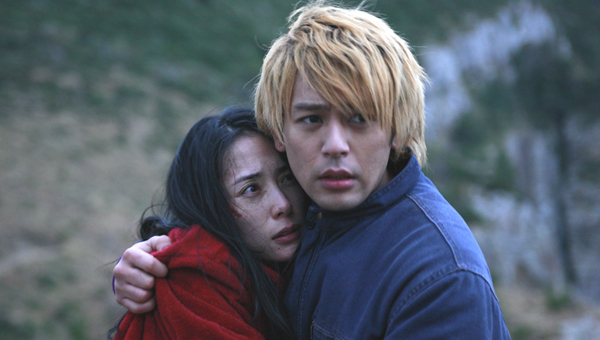Villain Review

Can you feel sympathy for a murderer? Are unjust actions that precede a crime as heinous as the act itself? These are two of the questions Japanese-Korean director Sang-il Lee asks his audience to contemplate while watching his award winning film Villain.
Yuichi Shimizu, played by Satoshi Tsumabuki, is a disenfranchised young man tired of his blue collar job, dismal surroundings and complete absence of a social life. Raised by his grandparents in a decaying fishing town near Nagasaki, Yuichi’s life starts to look up when he meets the beautiful Yoshino Ishibashi, played by Hikari Mitsushima, through an online dating site. However things take a turn for the worse when she ends their brief relationship out of the blue.
Soon after this, Yoshino is murdered; with the last person seen with her alive, wealthy university student Keigo Masuo, the prime suspect. But it’s only a matter of time until the police learn about Yuichi’s involvement in Yoshino’s life and a manhunt gets underway, with Yuichi the accidental fugitive.
Unperturbed by his last online experience, Yuichi meets another woman through the internet, Mitsuyo Magome played by Eri Fukatsu; a similarly disenfranchised working class girl who falls in love with Yuichi and joins him on his run from the law. As their intimacy grows, Mitsuyo gradually becomes both Yuichi’s rock and confidant; with the two driven forward on a journey that will unravel the mystery of the slain girl.
Japanese thriller Villain starts out as an investigation into the mysterious circumstances surrounding the death of a schoolgirl. Gradually, this storyline is usurped by a philosophical commentary on judgement, perception, intent over action, cause and effect as well as the fine line between good and evil. These themes are all masterfully communicated through a combination of fantastic on screen talent, cinematography and Director Sang-il Lee’s guiding hand.
Never one to tread on eggshells, Lee is synonymous for producing intense movies that consistently explore society’s supposed taboos and pariahs; subject matter that would scare off most directors. Lee, however, embraces the idea of challenging social norms and forcing his audience to think about something after they’ve watched one of his films.
Villain is no exception, challenging the public’s interpretations of an individual’s personal intentions and how intent is usually overshadowed by the act. Lee also stresses how the perception of a person or an action can vary so widely between people; therefore giving no concrete definition of right and wrong. Do we ascribe the term “villain” to someone whose intentions were good, when execution of said intentions goes totally awry?
Well, that’s left for the audience to decide.
Aside from Yuichi’s confusion and inner torment, coupled with Mitsuyo’s emotional journey searching for self worth and happiness, Villain focuses on the emotional consequences tragic actions have on the relatives of the victims as well as the perpetrators. These are principally illustrated by Akira Emoto and Kirin Kiki, cast as the grieving father and grandmother of Yoshino, who deliver Villain’s most emotional and moving scenes.
Villain vividly explores how misunderstandings can spiral out of control can ultimately transform the individuals surrounding a tragic event to a disgustingly savage degree; including that of the perpetrator.
It won’t slap everyone in the face with its philosophical musings but with a thrilling storyline Villain delivers on almost every level. Just don’t expect to come out of the cinema skipping down the street.
Kareem Ghezawi